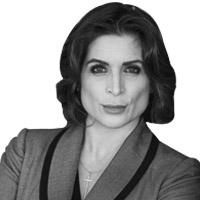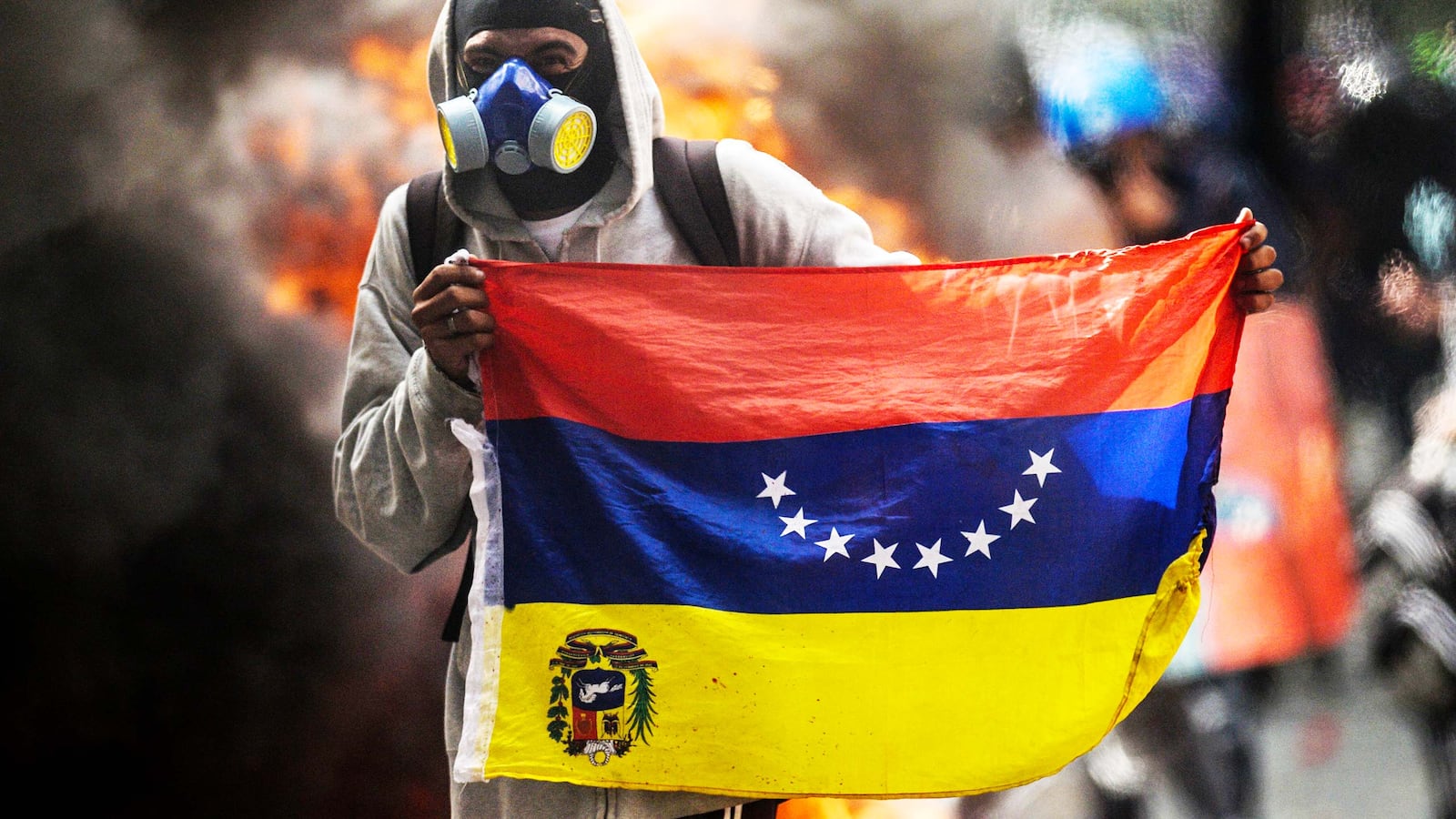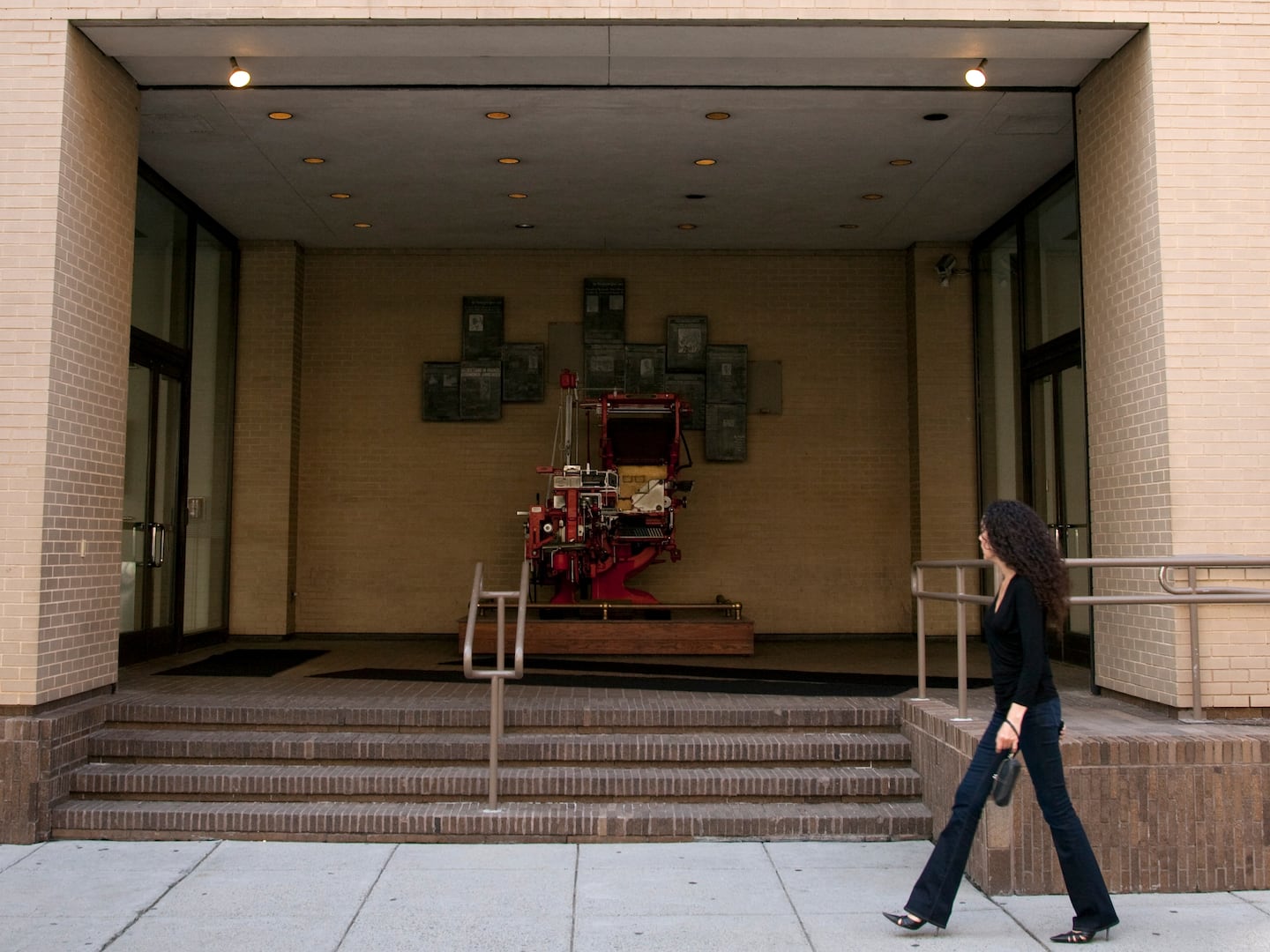The facts of the humanitarian and political crisis in Venezuela are now globally known: In a country that sits atop the world’s largest oil reserves, 90 percent of the people can’t find enough food to eat and turn to eating pets and trash, while citizens are run over by armored trucks for demanding food and elections. I saw the repression and violence firsthand when I was in Caracas last week; Goldman Sachs, it appears, can only see the return on its money.
The bank has made global headlines with what was meant to be a secret purchase of $2.8 billion worth of the Venezuelan state-owned oil company PDVSA’s bonds from the Venezuelan central bank through an off-radar broker. Goldman Sachs paid 31 cents on the dollar for the bonds, which mature in 2022 with a 6 percent return, significantly below the current market price of 43 cents on the dollar. The fire sale makes Goldman Sachs a 40 percent annual return while handing the violently repressive Venezuelan dictatorship $865 million to buy more weapons to murder citizens and keep itself in power.
The bond buy sparked a demonstration organized by the NGO SOS Venezuela NY outside the bank’s global headquarters, with members of the Venezuelan diaspora, including me, protesting that Goldman Sachs would “make a killing off the killing of the Venezuelan people.”
In a letter to Goldman Sachs CEO Lloyd Blankfein on May 29, Venezuelan National Assembly President Julio Borges pointed out that in more than 60 days of continual protests, the regime has murdered more than 60 people, injured 13,000, and illegally detained and prosecuted nearly 2,000 in military courts. On Tuesday, the same day as our protest, government forces beat Venezuelan opposition leader and two-time presidential candidate Henrique Capriles Radonski and opposition member of parliament Carlos Paparoni, who sustained a head wound that required stitches.
It gets worse: Having already canceled the presidential referendum and local and regional elections, scheduled for last December, this Wednesday and Thursday, the government is robbing us of all democracy by instituting a Cuban Leninist model of governance in which the “representatives” of the people are handpicked by the executive from a pool of applicants by vocation. These “delegates” will form a constitutional assembly to write a new constitution under which the dictatorship pinky-swears we will have elections.
But if we have learned anything these past 18 years, it is that the regime will cling to power by all means necessary, including murder, corruption, and possibly illegal funding by Goldman Sachs and Nomura, which bought $100 million of the same bonds through the same broker.
The Venezuelan regime has been pathologically obsessive about paying its bondholders, cutting down on food imports for its starving citizens in order to service its Wall Street debt. My compatriots and I call them “hunger bonds” or “blood bonds.” They scrape the bottom of the economic barrel and doom future citizens, for the benefit of a handful of murderous kleptocrats.
If the Venezuelan government does not default, Goldman Sachs and Nomura will triple their money. In the meantime, their money will extend the dictatorship and escalate the violence, launching the country into what everybody anticipates will be a brutal civil war. For Goldman, that’s even better: International organizations will stream in with taxpayer-funded development, further increasing the value of the assets it holds. In short, with this bond transaction, Goldman is paying to fund a civil war, from which it will profit.
The immorality of the transaction is matched only by its strangeness. In an email Tuesday to colleagues, Venezuelan financial expert Russell Dallen compared Goldman’s behavior to “a pawn-shop owner buying goods they know are stolen.” The president of the Venezuelan national assembly—the only remaining legitimate national institution, where the opposition won two-thirds of the seats in a December 2015 election—has called for a U.S. criminal investigation because of its multiple irregularities. Res ipso loquitur. The transaction was done in secret, without any notification of Venezuela’s national assembly.
The secret new bonds were bought from the Venezuelan central bank through a broker called Dinosaur, which had previously been fined by FINRA for not even having $250,000 in capital. The $865 million needed for the Goldman transaction therefore had to come from Goldman Sachs; Dinosaur was a pass-through to give Goldman plausible deniability in what was designed to look like an arm’s length transaction.
As the blowback started, Goldman tried to hide behind this thin veil, saying it had no interaction with the government and was making the investment because it believes life in Venezuela will get better. Yes, after the slaughter it funds. If it wanted to invest in the country, it should have bought bonds in the secondary market, not new bonds from the Venezuelan central bank, which hands money directly to the oppressors.
Goldman also stated the bonds were “being held in funds and accounts the company manages for clients.” Who are those clients? The money hit the central bank’s accounts in two tranches, so it appears that there was more than one client or they were purchased for more than one account. So far, it looks like the two transactions were for Goldman Sachs and Nomura.
According to data I have received from banking sources, Fidelity is by far the largest holder of both PDVSA ($757 million of debt), and Venezuelan debt ($665 million). The amount of holdings reported by both are relatively low (7 percent to 10 percent). Part of this is due to the amount held by Venezuela’s central bank, and another part is a reflection of the large holdings by hedge funds, which makes sense given where these securities are trading.
The long-standing rumor in Caracas has been that the bonds are ultimately owned by members or proxies or affiliates of the regime, meaning that they are paying themselves; hence the priority over food supplies. That makes the bonds essentially a money-laundering operation for a regime that has been heavily sanctioned for drug-trafficking. One can only imagine where the extra cash may come from in times of need. Last week, however, the regime did not need drug money. It had Goldman Sachs.
And the regime is proud of it, too. The story only emerged because the Venezuelan government leaked it to The Wall Street Journal. The regime wanted to brag that an institution as esteemed as Goldman Sachs was giving it credibility. The oppressors are particularly proud at a time when there are no fewer than three former Goldman Sachs executives in the White House: Treasury Secretary Steve Mnuchin, whose department loves to sanction the Venezuelan regime; Gary Cohn, the president’s chief economic adviser; and, lest we forget, Steve Bannon, the president’s chief strategist.
How ironic, then, that these drug-running dictatorial kleptocrats have hung themselves by the petard of their own vanity. The Venezuelan legislature has made clear that this debt was not incurred with the consent of Venezuela’s people, that it constitutes odious debt, and that Venezuela ought not to repay monies that were used by an illegitimate regime to keep itself in power against the will of the people. It will advise all future governments not to repay, and it is launching its own domestic investigation into the transaction and is writing to the U.S. Congress to ask it to investigate, as well.
It may seem paradoxical that an anti-American, socialist government should support itself with Wall Street’s brightest, but socialists know they can count on greed. Vladimir Lenin allegedly once said: “The capitalists will sell us the rope with which we will hang them.”
My compatriots and I would like to see any fines that are applicable be put into a trust for the recovery of Venezuela. Much better for Goldman to pay for food and medicine than bullets and armored trucks.
There is a clear lesson here for all who would seek to do business with Venezuela’s dictatorship: Don’t.






